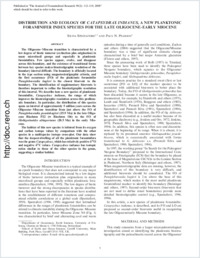Distribution and ecology of Catapsydrax indianus, a new planktonic foraminifer index species for the late oligocene-early miocene
- Spezzaferri, Silvia Department of Geosciences, Earth Sciences, University of Fribourg, Switzerland
- Pearson, Paul N. School of Earth and Ocean Sciences, Cardiff University, UK
-
2009
Published in:
- The Journal of Foraminiferal Research. - 2009, vol. 39, no. 2, p. 112-119
English
The Oligocene–Miocene transition is characterized by a low degree of biotic turnover (extinction plus origination) in many microfossil groups and especially in planktonic foraminifera. Few species appear, evolve, and disappear across this boundary, and the existence of transitional forms between key species makes biostratigraphic resolution of the boundary interval difficult. The boundary is officially located in the type section using magnetostratigraphic criteria, and the first occurrence (FO) of the planktonic foraminifer Paragloborotalia kugleri is the closest bioevent to the boundary. The identification of supplementary bioevents is therefore important to refine the biostratigraphic resolution of this interval. We describe here a new species of planktonic foraminifer, Catapsydrax indianus, the range of which improves the biostratigraphic resolution across this problematic boundary. In particular, the distribution of this species spans an interval of approximately 5 million years across the Oligocene–Miocene transition from just above the FO of Paragloborotalia pseudokugleri (25.9 Ma) in the late Oligocene Biochron P22 (= Biochron O6) to the FO of Globigerinoides altiaperturus (20.5 Ma) in the early Miocene. The habitat of this new species is inferred from its oxygen and carbon isotope values by comparison with the other species in a multispecies isotope cross-plot. Our data show that the deepest-dwelling of all the planktonic foraminifera was the genus Catapsydrax, which has relatively positive δ¹⁸O and negative δ¹³C values. Catapsydrax indianus has isotopic ratios similar to those of the other species in the genus, suggesting a similar habitat.
- Faculty
- Faculté des sciences et de médecine
- Department
- Département de Géosciences
- Language
-
- English
- Classification
- Palaeontology
- License
-
License undefined
- Identifiers
-
- RERO DOC 11993
- DOI 10.2113/gsjfr.39.2.112
- Persistent URL
- https://folia.unifr.ch/unifr/documents/301155
Statistics
Document views: 126
File downloads:
- pdf: 256
